Case: Stadtbibliothek Melle
"Die positive Resonanz ist überwältigend. Die anfängliche Skepsis bei einigen Kundinnen verflog schnell, nachdem diese die Geräte ausprobiert hatten.“
Mit der Umstellung auf die RFID-Technik von Lyngsoe konnte die Stadtbibliothek einen großen Schritt nach vorne machen und der Zukunft und neuen Entwicklungen zuversichtlich entgegenblicken.
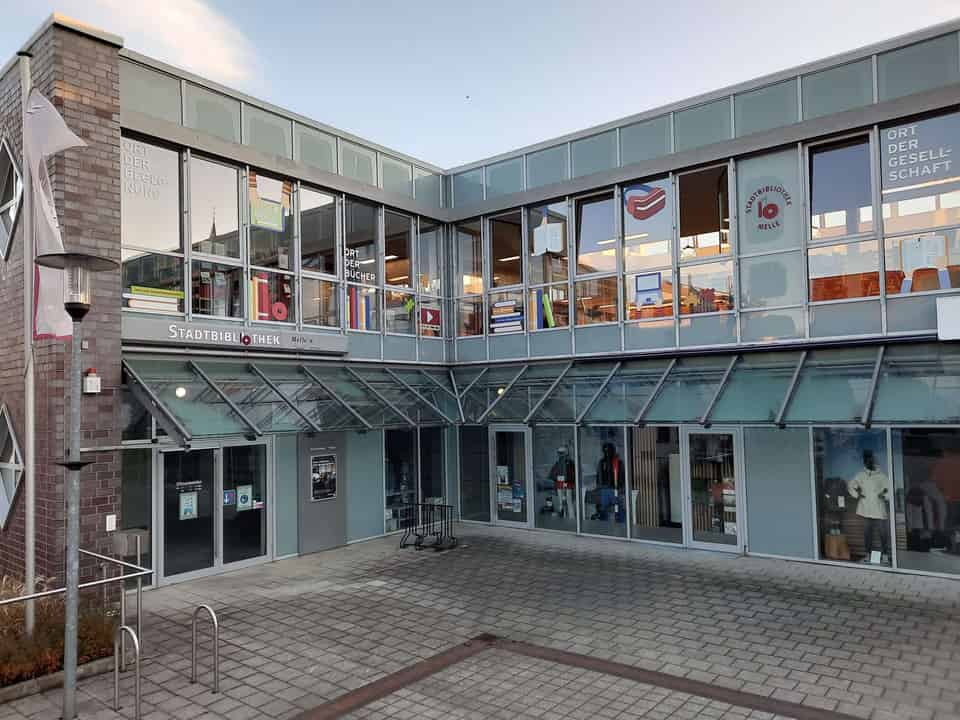
Stadtbibliothek Melle
Melle ist eine Mittelstadt in Niedersachsen mit ca. 48.200 Einwohner*innen. Mit über 70.000 Besuchen jährlich ist die Stadtbibliothek ein beliebter Treffpunkt mitten im Stadtzentrum und hat sich als Einrichtung mit überörtlicher Nutzung etabliert. Ein wichtiges Anliegen ist, dass die Bibliothek als für jedermann zugänglichen und gleichzeitig geschützten Raum ohne kommerzielle Interessen breit genutzt werden kann.
Ausgangssituation
Die Zugänglichkeit der Stadtbibliothek
Bis zu Beginn der RFID-Umstellung erfolgte die Verbuchung und Sicherung der Medien mittels Barcodes und Magnetstreifen. Diese Technologie war auslaufend und die Geräte teils so veraltet, dass im Falle eines Ausfalls kein Ersatz erhältlich gewesen wäre. Dieser Modernisierungsstau war nicht vereinbar mit dem steten Bestreben zeitgemäßen Service zu leisten.
Stand zunächst die technische Modernisierung im Vordergrund, ist in den Folgejahren die Reaktion auf den gesamtgesellschaftlichen Umbruch (Digitalisierung, demographischer Wandel, Flexibilisierung, Individualisierung) das Hauptargument für die Automatisierung der Verbuchungsprozesse geworden. Im Zuge des Wandels verändern sich auch die Anforderungen an die Serviceleistung der Stadtbibliothek. Neben dem Ausbau virtueller Angebote, steigt auch der Anspruch an die Qualität der Beratung und die Aufenthaltsqualität als „Dritter Ort“.
Die Zugänglichkeit der Stadtbibliothek sollte an den gewandelten Lebensumständen und veränderten Lebensgewohnheiten der Kundinnen ausgerichtet sein. Die 35 Öffnungsstunden sind aber nur durch die Unterstützung der ehrenamtlichen Mitarbeiterinnen möglich. Neben fünf Angestellten engagieren sich 25-30 Ehrenamtliche und bilden das „Herz und das Rückgrat der Stadtbibliothek“. Auch hier führte der gesellschaftliche Wandel zu einer nachlassenden Bereitschaft und Dauer des ehrenamtlichen Engagements bei gleichzeitig steigender Komplexität der Anforderungen. Der regelmäßige Ausleihdienst war zeitaufwendig und setzte eine starke zeitliche Verbindlichkeit der ehrenamtlichen Mitarbeiterinnen voraus. Durch die Corona-Krise erschienen regelmäßige Thekendienste auch im Hinblick auf Infektionsschutz und Verantwortung problematisch.
Um die Mindestabstände für Mitarbeiterinnen und Bibliothekskundinnen einzuhalten, musste einer der beiden Verbuchungsplätze stillgelegt werden. Dadurch hat das Arbeitstempo zur Vermeidung von Warteschlangen an Bedeutung gewonnen.
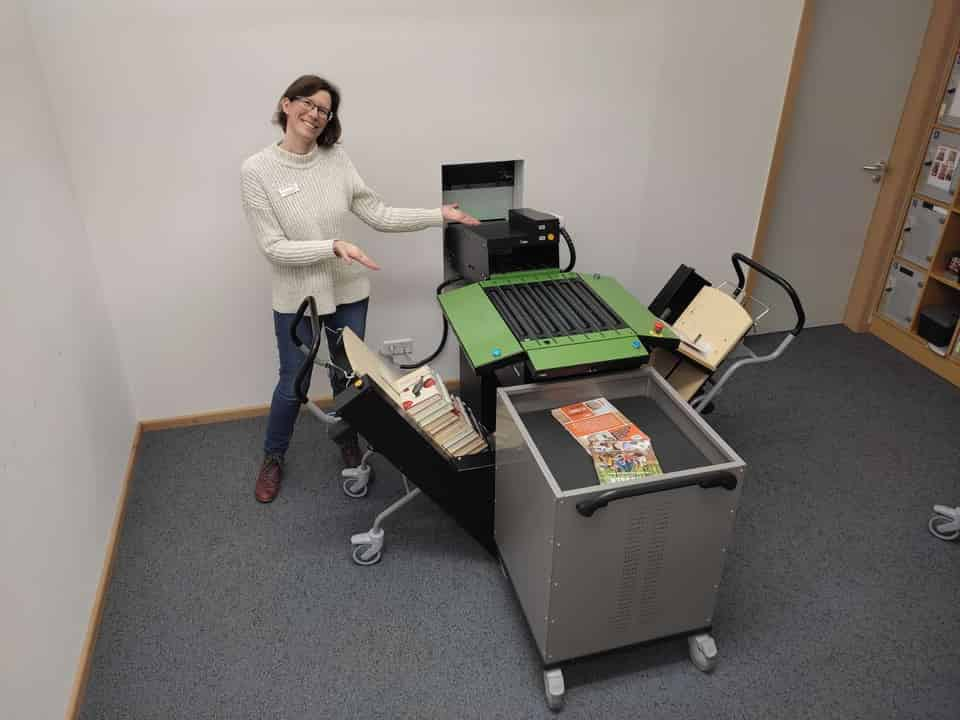
Die Mission
Anspruch
Die Umstellung auf RFID-Technik und Selbstverbuchungsautomaten sollte Abhilfe schaffen. Die Einsparung der Arbeitszeit durch die automatisierte Ausleihe, sollte eine Verlagerung der Arbeitsschwerpunkte, eine Anpassung des ehrenamtlichen Engagements und eine Serviceoptimierung ermöglichen. Für eine durchdachte und langfristig funktionale Umstellung auf Selbstverbuchung wurde ein Bedarf von zwei Selbstverbuchungsgeräten zur Ausleihe und Kontoeinsicht, einer Rückgabestation, einem Abholschrank für reservierte Medien, einem Kassenautomat sowie eines Sicherheitsgates mit integrierter Besucherzählung bestimmt.
Bei der Suche nach einer passgenauen Lösung für die Medienrückgabe wurden verschiedene Optionen abgewogen. Wesentliche Aspekte bei den Überlegungen waren Barrierearmut und Ergonomie für Kundinnen und Mitarbeitende. Daneben spielte auch der Wunsch nach einer modernen und „aufgeräumten“ Optik eine große Rolle. Die Rückgabestation befindet sich direkt im Eingangsbereich der Stadtbibliothek und prägt somit ganz entscheidend den ersten Eindruck der Besucherinnen. Schnell manifestierte sich so die Notwendigkeit einer Lösung, bei der die Medien direkt ins Mitarbeitendenbüro transportiert werden können. Entsprechende Geräte waren bis dato nur aus großen Bibliotheken bekannt. Die Projektverantwortlichen kamen aber zu dem Schluss, dass auch für die Stadtbibliothek Melle eine deutliche Qualitätssteigerung durch eine solche Lösung möglich wäre.
Das Förderprogramm
Als sie auf das Förderprogramm „WissensWandel“ des Deutschen Bibliotheksverbandes (dbv) aufmerksam wurden, rückte dieser Wunsch plötzlich in greifbare Nähe und man entschied sich im laufenden Prozess für eine Bewerbung. Das Programm ist Teil des Rettungs- und Zukunftsprogramms NEUSTART KULTUR der Beauftragten der Bundesregierung für Kultur und Medien und fördert Maßnahmen zur Schaffung und Ausbau von nachhaltigen digitalen Angeboten in öffentlich zugänglichen Bibliotheken. Der Antrag hatte Erfolg. Die Stadtbibliothek Melle erhielt die höchstmögliche Fördersumme. Mithilfe dieser Unterstützung konnte ein Rückgabeautomat mit kleiner Sortierstation ausgeschrieben werden
Umsetzung
Konvertierung von 37.000 Medien über 3 Monate
Für die RFID-Umstellung mussten zunächst sämtliche Medien mit RFID-Etiketten versehen und die Informationen vom Barcode auf diese übertragen werden. Durch den außerordentlichen Einsatz der haupt- und ehrenamtlichen Mitarbeiterinnen konnte Ende 2021 der Bestand von über 37.000 Medien innerhalb von nur drei Monaten parallel zum normalen Bibliotheksbetrieb konvertiert werden.
Im Frühjahr 2022 konnten die RFID-Selbstverbuchungsgeräte sowie mehrere RFID-Pads für die Arbeitsplätze ausgeschrieben werden. Die Firma Lyngsoe Systems erhielt den Zuschlag und sogleich wurde mit der Planung für die Umsetzung begonnen. Leider verschonten die weltweiten Lieferengpässe zu diesem Zeitpunkt auch dieses Projekt nicht und der geplante Installationstermin musste verschoben werden. Im fortwährenden gegenseitigen Austausch konnte die Zwischenzeit gut genutzt werden, um die Vorbereitungen zu treffen, damit der finale Anschluss der Geräte schnell und unkompliziert erfolgen konnte.
Positiv hervorzuheben ist, dass die Kommunikation mit Lyngsoe stets offen, vertrauensvoll und lösungsorientiert verlief. So war die Stadtbibliothek auch in dieser unerfreulichen Situation stets auf dem Laufenden und umso größer war die Freude, als alle Komponenten im September 2022 geliefert, installiert und kurz darauf in Betrieb genommen werden konnten.
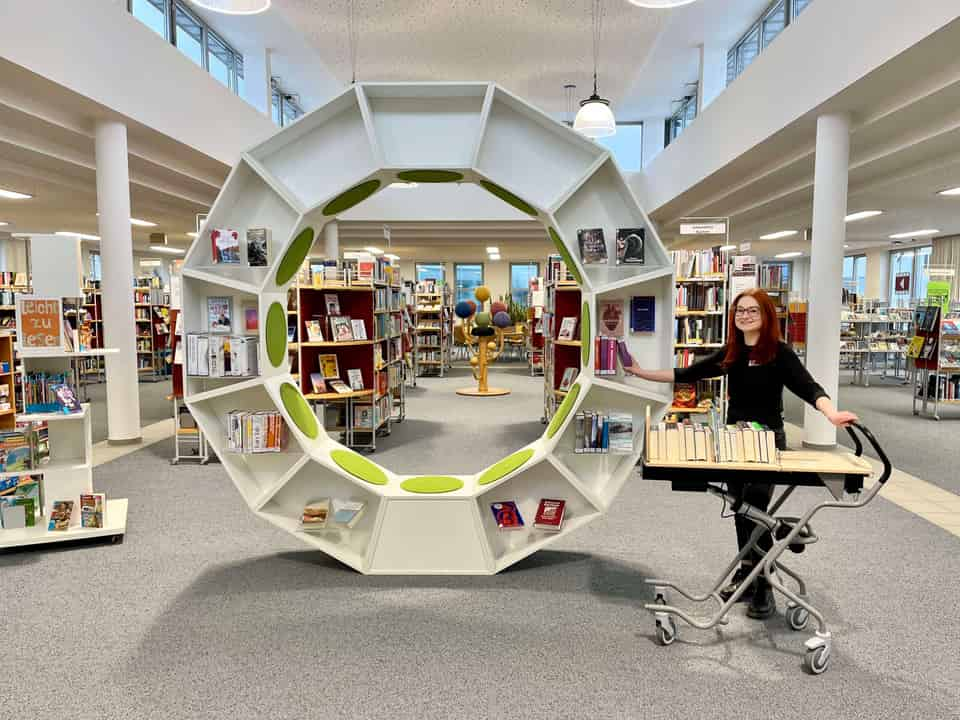
Aktueller Stand
Seitdem erstrahlt die Stadtbibliothek Melle in neuem Glanz. Der Eingangsbereich, den zuvor eine Theke zur personengebundenen Verbuchung dominierte, wurde zu einer modernen und einladenden Selbstbedienungszone umgestaltet. Im Zuge der Umbaumaßnahmen wurde ein neuer Raum geschaffen, in den zurückgegebene Medien transportiert und direkt bearbeitet werden können und an dessen Wand die neuen Geräte optimal zur Geltung kommen. Durch die Freiheit in der Farbgestaltung fügen sich die Komponenten harmonisch ins Gesamtbild ein und schaffen einen attraktiven Hingucker direkt beim Betreten der Bibliothek.
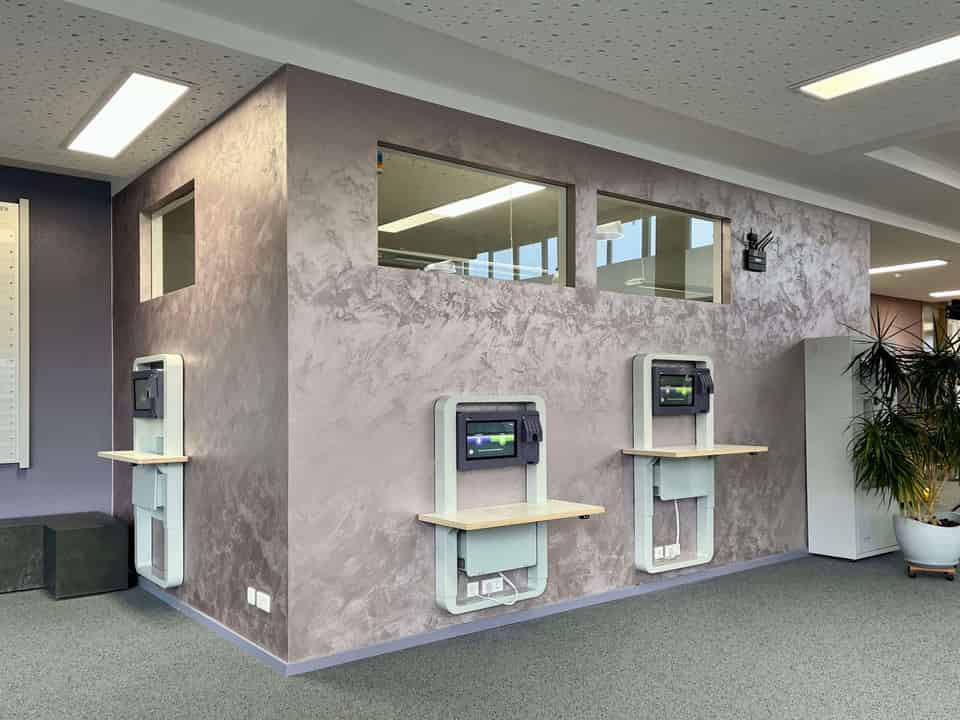
Aktueller Stand
Überwältigend positive Resonanz von Kundinnen und Mitarbeiterinnen
Die positive Resonanz ist überwältigend. Die anfängliche Skepsis bei einigen Kundinnen verflog schnell, nachdem diese die Geräte ausprobiert hatten und feststellten, wie einfach und selbsterklärend die Nutzung ist. Bisweilen meldeten diese sogar zurück, dass ihnen die Verbuchung Spaß macht. Ebenso positiv wurde die Höhenverstellbarkeit der Geräte aufgenommen und besonders Kinder freuen sich, bei der Verbuchung partizipieren zu können. Insgesamt haben sich die Wartezeiten für die Kundinnen durch die Trennung von Ausleihe, Rückgabe, Abholung sowie Information und Beratung drastisch reduziert.
Auch die Mitarbeiterinnen der Stadtbibliothek sind erleichtert darüber, wie einfach die Arbeit mit der neuen Technik fällt. Für sie bringt diese Veränderung weitreichende Entlastungen. Nicht nur, dass durch die Selbstbedienung der Kundinnen der Personalbedarf an der Theke reduziert wird, auch interne Geschäftsgänge können durch die Stapelverbuchung deutlich effizienter gestaltet werden.
Der Rückgabeautomat Library Mate 5000 mit kleiner Sortierstation, der direkt ins Mitarbeiterbüro führt, vervollständigt den Ansatz, die Automatisierung konsequent und mitarbeiterentlastend einzusetzen. So können einerseits unnötige Wege mit dem Bücherwagen vermieden werden, da die Medien direkt am Arbeitsort sind und dort auf den flexiblen und wendigen Ergo Carts weiterbearbeitet werden können. Dies entlastet die Mitarbeiter nicht nur zeitlich, sondern auch körperlich und ermöglicht zudem in Pandemiezeiten eine kontaktarme Arbeitsweise. Andererseits spart auch die erste Grobsortierung auf drei Sortierziele Zeit ein und zeigt, dass eine Sortieranlage in einer kleineren Bibliothek eine Bereicherung darstellt.
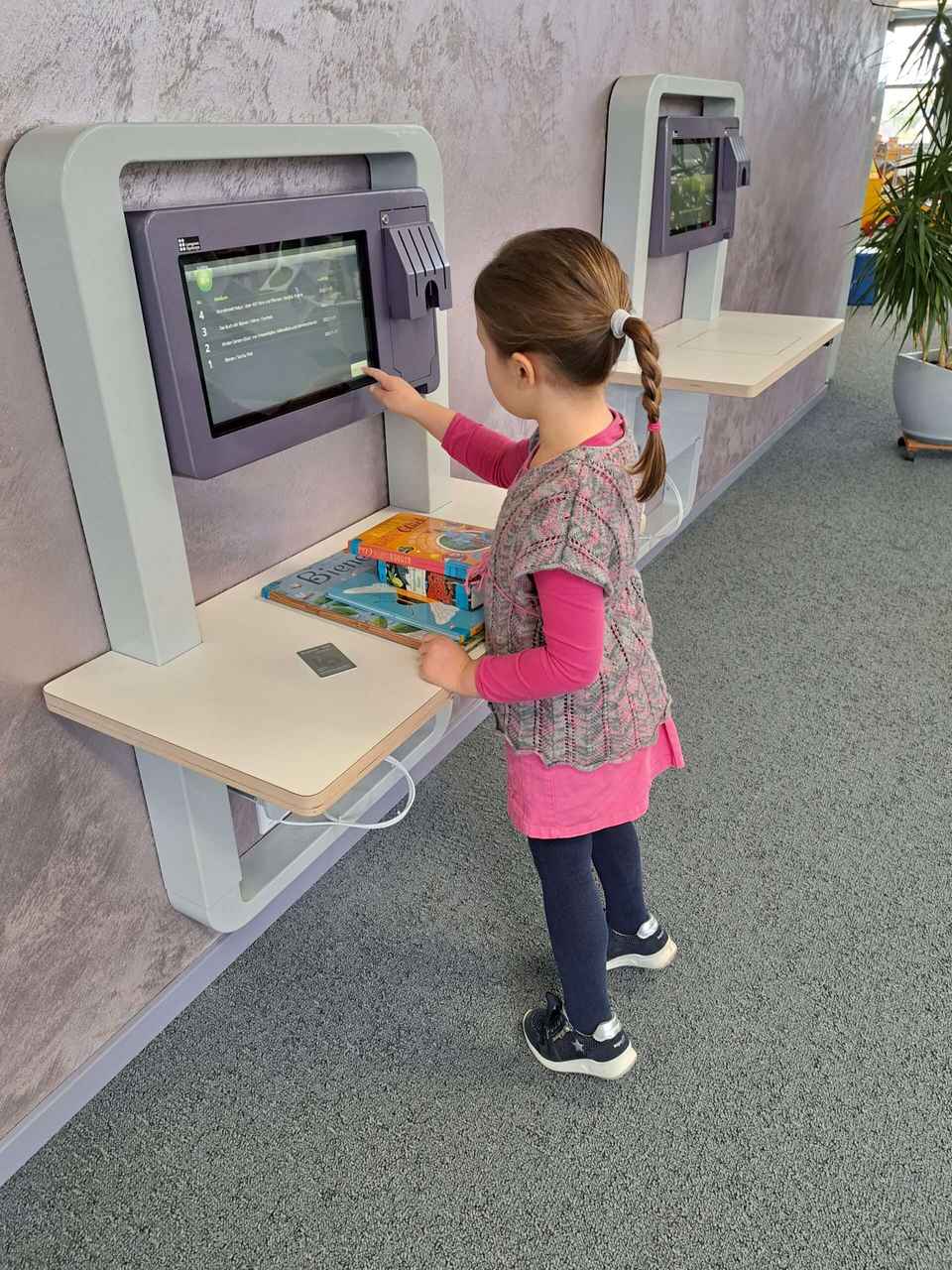
Ausblick
Im täglichen Betrieb konnten die Komponenten bereits ihre Zuverlässigkeit und Robustheit unter Beweis stellen, so dass die Stadtbibliothek Melle wohl langfristig Freude daran haben wird. Die Zeit, die durch die Automatisierung eingespart wird, bietet die Möglichkeit einer qualitativeren Beratung und soll künftig auch für den Ausbau der Veranstaltungsarbeit genutzt werden. Darüber hinaus ist nun auch eine flexiblere Einteilung der Arbeitszeit, insbesondere der ehrenamtlichen Mitarbeiterinnen denkbar.
Zudem können nun die Öffnungszeiten langfristig beibehalten oder gar erweitert werden. Die Einführung einer servicefreien Zeit, in der die Selbstverbucher genutzt werden können, ohne dass Arbeitskräfte an der Theke gebunden sind, ist nun ein realistisches Vorhaben. Der Mehrwert zeigt sich auch jetzt schon. Bisher gab es bei Veranstaltungen in der Bibliothek, die außerhalb der Öffnungszeiten lagen, keine Option zur Ausleihe und Rückgabe von Medien. Durch die Selbstverbuchungsgeräte ist dies nun möglich und wird – nach ersten Erfahrungen – auch rege genutzt.
Mit der Beibehaltung, bzw. Erweiterung der Öffnungszeiten wird die Bibliothek ihrer überörtlichen Versorgungsbedeutung gerecht(er). Insbesondere profitieren davon Besucher, die die Bibliothek als Aufenthaltsort nutzen möchten und Besucher aus anderen Stadtteilen und Ortschaften mit langen Anfahrtswegen.
Mit der Umstellung auf die RFID-Technik von Lyngsoe konnte die Stadtbibliothek einen großen Schritt nach vorne machen und der Zukunft und neuen Entwicklungen zuversichtlich entgegenblicken.